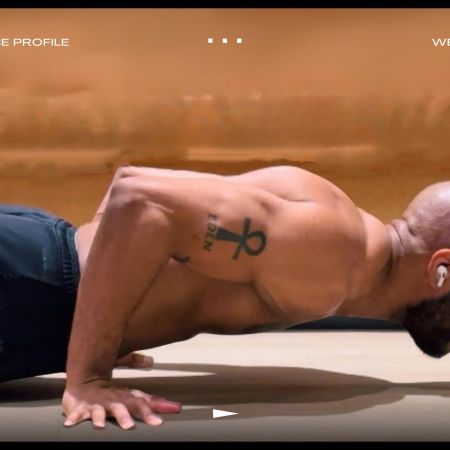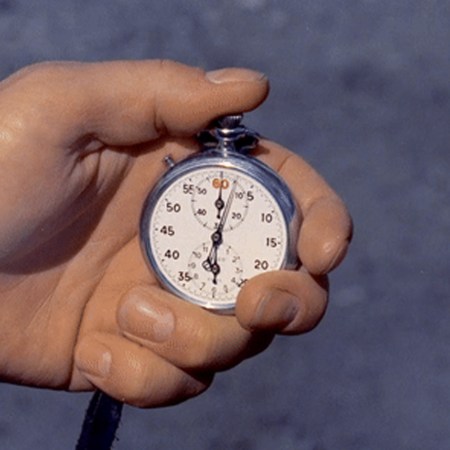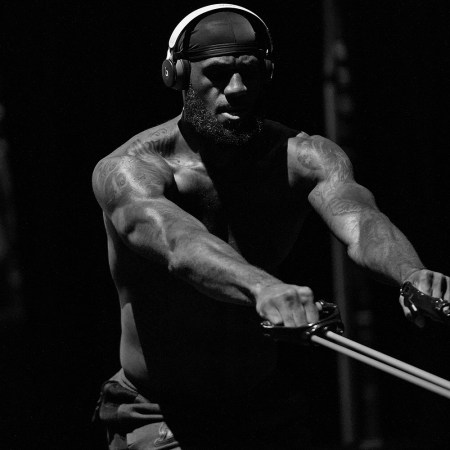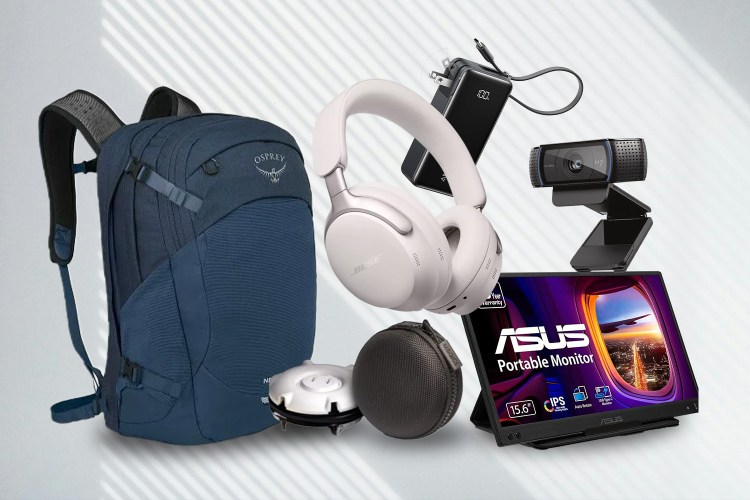Miles Chamley-Watson was forced to take up fencing as a punishment after getting into trouble in grade school. But what started as a penalty became a passion.
Soon the 6’5” British-American athlete realized that his size, speed and natural quickness made him dangerous with a foil. In 2013, he became the first and only U.S. fencer to win an individual gold medal at the World Championships. He’s since won a dozen Pan American championships, and was part of the American team that took home bronze at the 2016 Olympics.
Chamley-Watson is far from done. Earlier this year, he earned his spot in the four-man foil team that will represent the United States at the 2024 Summer Olympic Games in Paris.
We sat down with the Olympian at the Red Bull North American headquarters in Santa Monica, California (Red Bull was one of his first athletic sponsors) to hear about his drive, his workouts, the physical toil of fencing and his preparation for Paris.

InsideHook: Can you explain how fencing first found you?
Chamley-Watson: I was a hyperactive kid and I got into trouble early on in my childhood. Fencing was introduced to me as a required after-school activity. I was 10 years old, acting out, and was told that I had to do tennis, badminton or fencing, for a few hours after school. I decided to pick fencing, because in my mind it was about playing with swords.
I know it was meant to be disciplinary, but the first time I had the foil in my hands — wearing the protection, putting on that mask — I felt like a real-life superhero. I had found a passion in my life, and it started to benefit me in a lot of ways. Fittingly, I found discipline through that passion and it translated into other parts of my life. My grades started to get better as well.
Being a tall kid — and now a tall adult — have you found it an advantage when fighting competitors?
I learned early on that I had a longer reach but that also meant I had a bigger target. One of the best elements of fencing as a sport is that you can be any size and succeed. I had this advantage of being tall, but it didn’t become really an advantage until I built up my flexibility as well. The majority of people my height aren’t as flexible as I am.
I didn’t have anyone who looked like me who was fencing for a career that I could look up to. No one had built that bridge ahead of me. Because of that, I needed to really believe in myself and my abilities. And I needed to find ways to train those aspects that were unique to me. In my heart, I knew that I was going to be able to make this work, one way or another.
One of the issues I’ve found from talking to people about fencing: no one understands how physical it is. That the strikes are real and there’s a possibility for injury.
I find it funny that the first thing that people think of about fencing usually comes from pop culture references like The Parent Trap. They think of it as this light activity. But it started as duels to the death, and though it’s rare, people have died fencing. At the very least, it’s a combat sport in its truest essence.
I know it’s not possible for everyone, but I invite people to step into a fencing class or school to really feel what it’s like. You feel these strikes. It’s not a light tap on the sleeve. Tears of the ACL and MCLs are super common in our sport because we change directions so quickly. I’ve broken all of my fingers. I got hit on my knee a month ago — the foil hit my knee cap, and it’s still hurting. I wanted to kill my training partner.
I’ve had an MRI since, and it’s not serious, but it’s just an annoying thing that I have to deal with. These are just the realities of this sport.
The Training Secrets of the New 50-Mile King
Charlie Lawrence can do a lot in five hours. Here’s how the ultrarunner set a new world record.I’m guessing after so many years competing you’ve done a lot of workouts and learned how to best train for this sport.
I have done a lot of different kinds of training over the years. I’m lucky that these days I have a full performance team that helps me out here at Red Bull HQ. They created a detailed plan for me: when to peak and when to dial down the workouts. I’m very lucky that I get that kind of next-level assistance, because not all athletes do without having to pay a ton for it. I’m here working out for around three hours, five days a week, with the best gear in the world.
I do a lot of explosive lifts, which translates well to the sport. There needs to be strength, but in very specific ways. Your forearms are built out in a special way, because of the how you have to grip the foil. You’re holding that foil for so damn long. We do deadlift cleans. Bodyweight exercises, like pull-ups with crunches. We do the sled push. At Red Bull HQ there are a number of incredible Keiser machines that we will use, like the squat machine, which tracks the force I’m able to put out. Nobody has beat my numbers on that.
There is no set blueprint for what a fencing body should look like, which is cool, but that can also complicate your training protocol. One thing that’s really unique: one side of the body is more developed than the other, because of our positioning. The right side of my body is twice as big as my left, because of how you have to defend and propel yourself on the attacks.
Outside of the traditional gym, do you train in any other ways that translate well to fencing?
I think boxing has a lot of overlap, and the boxing training that I’ve done applies well to the movements we make fencing. The stance is very similar. And in the same way, it’s kind of a game of chess being played with your body. There’s so much going on both mentally and physically.
I do reaction training every session. We have lights we work with, plus an on-screen exercise. We’ll do colored light reactions, sequences, memory drills. We also use the HECOstix for reaction and processing. I’m the king of the HECOstix. I’ll practice with it while I’m balancing on a Bosu ball, to make it extra challenging.
I’m always looking for new ways to challenge my balance and strength. I recently did yoga with Red Bull coach Alex Bunt, which was brutal in its own way.
As we head into the next Olympic Games, can you remember what it was like going into your first one?
My first Olympics was in 2012, in my hometown of London, which made it especially powerful for me. I was still in college at the time. I was just happy to be there. I came in fourth in that one. I won my first Olympic medal in 2016, which was a bronze. I would say most Olympians are only relevant or getting talked about the year before the Olympics. There are very few athletes who can support themselves through the training and competition.
Early in my career, Nike offered me my first sponsorship ever and soon after I signed with Red Bull, which was also a dream sponsorship. Those opportunities gave me the support I needed to pursue fencing full-time. It has always shocked me that you could be sitting on the bench of an NBA team and make more than athletes who are representing their country as the best athletes in the world. People who are winning these medals through years of dedication — they deserve more.

I have to imagine, that when the difference between winning and losing it all can be a matter of centimeters, there’s a lot of mental pressure. Have you had to work on that element of your game as well?
I’ve always had good mental strength. But I was also lucky that early on in my competitive career, I was able to get advice from one of the best, Kobe Bryant. I was at the 2012 Olympics and I had lost my match, just missing the chance to win a medal. That’s when Team USA basketball came into the athlete area.
Kobe was there putting ice on his arm and when he saw how I was feeling about losing he told me this quote that I will never forget. “The greatest athletes have the shortest memory,” he said. That quote is tattooed on my leg now. I processed that loss and then forgot it, which I think helped me win the World Championship the next year.
It’s in our human nature to overcomplicate things, especially when it comes to how we process and sit with losses. If you’re able to attack each new day without being dragged down by what happened previously, then you’re already ahead of the game.
That win was special, but on the other side it was a complete blur. I woke up the next morning and had to check my bag, because I thought it might have all been a dream.
Given how rough the sport can be on the body, what modes of recovery have you found success with over the years?
I put a Clearlight infrared sauna on my roof and I’m using that literally every day. I know people live by the cold plunge, but I hate it so much. I’m not jumping in there. Sauna is where it’s at for me. I’ll take the heat every day. My coach is Ukrainian so we go to the Russian baths every week. I love to roast. I’ll do a little stretch in there as well. You sleep so well after a good sauna. I also have the Normatec boots for recovery, which I’ll use after a particularly grueling session. The final piece is making sure that I get enough sleep.
On that subject, I know you have a very busy calendar with appearances, including F1 races, which you visit to support your friend Lewis Hamilton. How are you making sure that you get enough sleep?
Lewis Hamilton is one of my best friends. We’ve trained together a number of times. I enjoy spending time with him during my off-season, going to races and everything else. I think it helps me to take my mind off of competition so I can recover properly. I would say we both struggle when it comes to getting a great night’s sleep on a daily basis, but are still able to perform. I actually think I sleep the best on the plane.
The only other time I get great nights of sleep are when I’m in competition or doing training camp. For me, a good night’s rest is six and a half hours. I actually don’t understand how people get eight hours or more. The issue with getting more is we do our training late at night. I get home around 9:45 in the evening. That’s on Mondays, Wednesday and Fridays.
I have a lot of adrenaline pumping through my body after that, and it’s hard to go to sleep right away. I’ll finish eating around 10:30 in the evening and then I can’t go to bed right away, so I’ll usually watch a movie or television show after that. I can’t watch something too involved; it has to be entertaining but formulaic enough that I can still fall asleep. I’ll use a sound machine when I’m in different environments, usually set to the rain setting.
What shows do you like to watch?
I have been watching those shows Alone and Naked and Afraid.
Speaking of watching videos, do you study footage of your opponents? For example, heading into the Paris Olympics, are you studying your possible competition?
I’ve always studied video of myself to see how my strikes are looking and where I might have potential openings for attack. And during training camp, my coach will have me analyze opponents. I try not to watch too much, though, because I don’t want to get too much in my head about each match. I just want to know generally what they are best and strongest at with their defense and offense.
From there I can allow my own skillset and reaction ability to ultimately get me the win. There are a lot of mind games that go on in competition. There are a few ways that you can go about it. You can talk a little trash, walk slowly to the line, stop to tie your shoes and do whatever else to play with their head. But really, showing up on the line as your best self is the more assured way to win.
When do you land in Paris? What can you expect in the run-up to your matches?
I’ll get there July 17 and be able to train for about two weeks before we compete. It’s important to keep the routine as normal as possible during that time, so that the acclimatization isn’t too shocking. Olympic Village is a very unique and special place. It’s incredible to be around so many amazing athletes from these different places. You find yourself running into your competition during the week, even at the gym and the cafeteria.
The whole Olympic experience is surreal. There’s nothing like it. I’m going to do whatever I can to make sure I’m at Los Angeles 2028 as well. That is not an Olympics that I would want to miss, getting to compete in this country. But for now, I’ve got my focus on Paris.
Whether you’re looking to get into shape, or just get out of a funk, The Charge has got you covered. Sign up for our new wellness newsletter today.

























